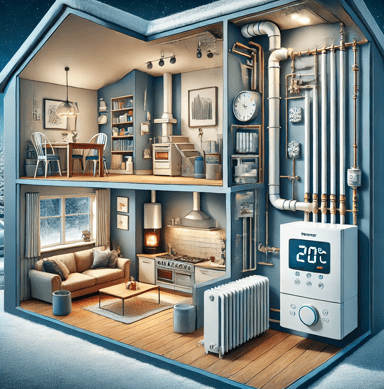
Boilers are essential for keeping UK homes warm and cozy, especially during the colder months. Proper usage and maintenance can help you save money, avoid unnecessary repairs, and stay comfortable. Here are some important tips based on frequently asked questions and government recommendations to help you make the most of your boiler.
1. What temperature is the best to set my boiler at?
The UK government suggests setting your boiler’s water temperature to 60-65°C. This helps prevent bacteria like Legionella while avoiding scalding risks and excess energy use. For heating, keep your thermostat at 18-21°C, the ideal range for comfort and energy efficiency.
If you have older adults, children, or individuals with health conditions in the house, ensure the temperature remains at 18°C or higher to maintain a safe and comfortable environment.
2. Should I keep my boiler running constantly or turn it on and off?
Turning your boiler off when not needed is generally more energy-efficient. Modern boilers can heat your home quickly, especially when paired with a programmable thermostat. Set your heating to come on during key times, such as mornings and evenings, and turn it off when the house is empty.
If you’re in an extremely cold area, consider maintaining a low, steady background temperature to prevent frozen pipes or discomfort.
3. What should I do if my boiler pressure is too low or too high?
A healthy boiler pressure should range between 1 and 2 bar. If it’s too low:
- Refill the system using the filling loop (consult your boiler manual).
If it’s too high: - Bleed the radiators to release trapped water and reduce pressure.
Persistent pressure problems may indicate a fault with the pressure relief valve or expansion vessel, which will require a professional to inspect.
4. Is it safe to turn my boiler off overnight to save energy?
Turning off your boiler overnight is safe but not always practical, especially in winter. Instead, lower the temperature to around 16°C using a programmable thermostat. This helps save energy without letting your home get too cold, which could lead to issues like frozen pipes or dampness.
5. How can I bleed my radiators, and why is it necessary?
Bleeding radiators removes trapped air that prevents them from heating efficiently. To bleed a radiator:
- Turn off your heating system.
- Use a radiator key to open the bleed valve slightly.
- Close the valve when water begins to flow steadily.
Regular bleeding ensures your heating system operates efficiently, saving energy and improving comfort.
6. Should I turn down radiators in rooms I’m not using?
Yes, turning down radiators in unused rooms to a lower setting can save up to £40 a year on your energy bill. However, avoid turning them off completely, as this forces the boiler to work harder to maintain the temperature in other rooms and can lead to damp or mould issues.
To maintain efficiency, keep radiators in unused rooms at a setting of 2 or 3, ensuring the room doesn’t get too cold.
7. Can I install a smart thermostat with my boiler?
Smart thermostats like Nest, Hive, or Tado are compatible with most modern boilers. These devices let you control your heating remotely, schedule temperatures, and optimize energy usage. Advanced features like geofencing (heating turns on when you’re near home) and energy reports can further help you reduce your bills.
Thermostats in Amazon: https://amzn.to/494DUET
8. What should I do if my boiler stops working in winter?
If your boiler stops working during the cold months, follow these steps:
- Check your thermostat: Ensure it’s set correctly and has working batteries.
- Inspect the power and gas supply: Ensure there are no interruptions.
- Thaw a frozen condensate pipe: In freezing weather, this pipe can freeze. Pour warm (not boiling) water over it to thaw.
If the problem persists, call a Gas Safe registered engineer for professional help.
9. Find and fix draughts to save energy
Drafts around windows, doors, and other openings can let heat escape and make your boiler work harder. Seal gaps with draught-proofing strips or sealants to retain heat and save up to £40 a year on heating costs.
By following these tips, you can save money, stay warm, and keep your boiler running efficiently all year round. Regular maintenance and smart heating habits are the keys to reducing energy waste and ensuring your home remains comfortable.
Our Whatsapp broadcast List (English): https://livinintheuk.com/broadcast_en




